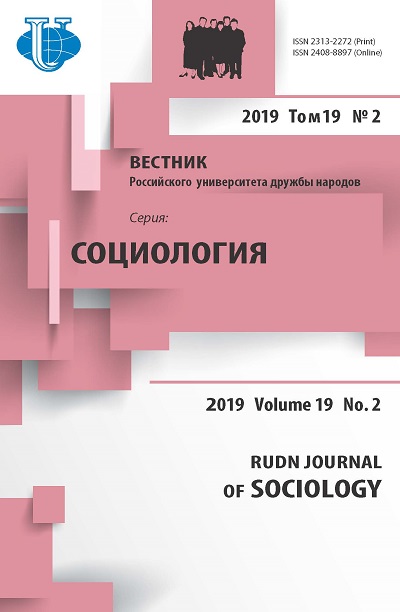‘Small sociality’ in the world of large sociology: Reflections on the ideas of R. Collins (to the 30th anniversary of the City Sociological Workshop in the SPSU)
- Authors: Deriugin PP1, Lebedintseva LA1
-
Affiliations:
- Saint-Petersburg State University
- Issue: Vol 19, No 2 (2019)
- Pages: 352-363
- Section: Scientific life
- URL: https://journals.rudn.ru/sociology/article/view/21106
- DOI: https://doi.org/10.22363/2313-2272-2019-19-2-352-363
Cite item
Full Text
Abstract
The year 2019 marks the thirtieth anniversary of the Sociology Department of the Saint-Petersburg State University. During all this period, there was the City Sociological Workshop with the meetings held several times in the academic semester to discuss the most relevant controversial issues related to both theoretical sociology (especially new approaches) and the Russian society social life. The initial idea of the Workshop was to ensure communication between scientists and researchers, and the development of intellectual activity, exchange of ideas and solidarity of sociologists of Saint Petersburg. Then the scope of discussions widened and covered a broader Russian context and even international topics. Thus, speakers of the Workshop today are from different Russian cities and other countries. Despite the changed format, the Workshop kept its name - City Sociological Workshop - as a well-known and recognizable brand for the sociological community. Today, there are several forms of its activities: methodological workshops, presentations, meetings and schools. As a small organizational form the Workshop has many advantages described by R. Collins. In particular, the analysis of the ‘network maps’ of interpersonal relationship allowed Collins to argue that the creation of ‘small groups of direct contact’ ensures a social space in which new ideas are developed and accumulated, and intellectual rituals, ‘rivalry for the space of attention’ and other basic elements of the evolution of the scientific thought are formed [1]. Despite different difficulties of thirty years under the changing social and technological realities of the information society, the City Sociological Workshop proves its necessity and importance at the beginning of the third decade of the twenty-first century.
About the authors
P P Deriugin
Saint-Petersburg State University
Author for correspondence.
Email: ppd1@rambler.ru
-
University nab., 7-9, Saint Petersburg, 199034, RussiaL A Lebedintseva
Saint-Petersburg State University
Email: llebedintseva879@gmail.com
-
University nab., 7-9, Saint Petersburg, 199034, RussiaReferences
- Alpatova E.S. Svobodnye ekonomicheskie zony: teoreticheskie aspekty issledovaniy [Free economic zones: Theoretical aspects of the research]. Aktualnye Problemy Ekonomiki i Prava. 2008; 3 (In Russ.).
- Amkuab (Mikvabia) G.A. Intentsii ‘demassifikatsii kultury’ v sovremennom obshche [Intentions of the ‘demassification of culture’ in the contemporary society]. Izvestiya IGE. 2014; 2 (In Russ.).
- Boronoev A.O., Negrova M.S., Sharov A.V. Gorodskoy sotsiologichesky seminar: rezultaty raboty [City Sociological Workshop: The results of work]. Vestnik SPbGU. Seriya 12: Psikhologiya. Sotsiologiya. Pedagogika. 2015; 3 (In Russ.).
- Kapitsa P.L. Eksperiment, teoriya, praktika [Experiment, Theory, Practice]. Moscow; 1974 (In Russ.).
- Collins R. Sotsiologiya filosofiy: globalnaya teoriya intellektualnykh izmeneny [The Sociology of Philosophies: A Global Theory of Intellectual Change]. Novosibirsk; 2002 (In Russ.).
- Kuvakin V.A. Tvoy ad i ray: chelovechnost i beschelovechnost v cheloveke [Your Hell and Paradise: Humanity and Inhumanity in Man]. Moscow; 2008 (In Russ.).
- Mirskaya E.Z. Novye informatsionno-kommunikatsionnye tekhnologii v Rossii: istoriya i rezultaty [New information and communication technologies in Russia: History and results]. Sotsiologiya Nauki i Tekhnology. 2010; 1 (In Russ.).
- Smolkina D.V. Kontseptsii demassifikatsii v sovremennom kulturologicheskom znanii: media-diskurs [The concept of demassification in the contemporary cultural studies: The media discourse]. Omsky Nauchny Vestnik. 2010; 4 (In Russ.).
- Toffler A. Budushchee truda [The future of labor]. Novaya tekhnokraticheskaya volna na Zapade. Moscow; 1986 (In Russ.).
- Bhosale B. History of Matheran Hill Station in India. Obshchestvo. Sreda. Razvitiye. 2018; 3.
- Toffler A. The Third Wave. New York; 1989.














